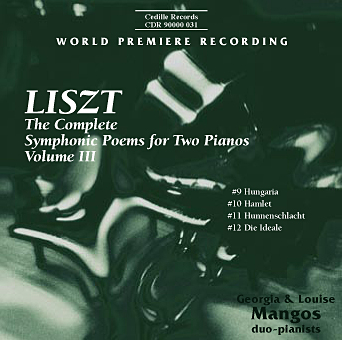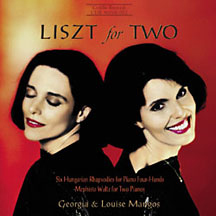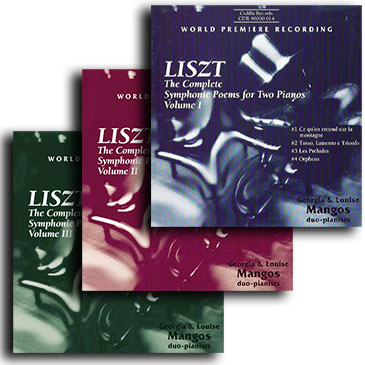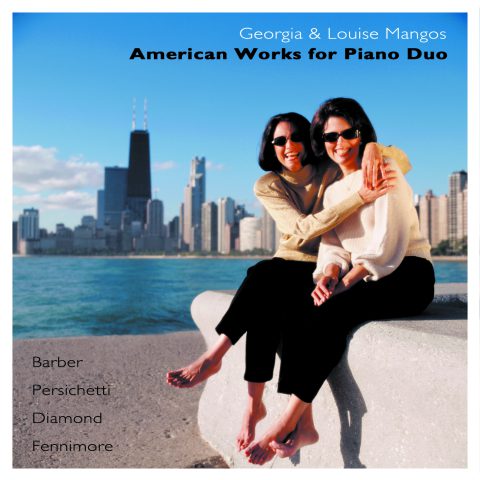| Subtotal | $18.00 |
|---|---|
| Tax | $1.85 |
| Total | $19.85 |
Store

Store
Liszt: The Complete Symphonic Poems for Two Pianos – Vol. III
This is the final volume in our historic collection of Liszt’s own two-piano versions of his 12 symphonic poems from the Weimar period (1848-61). The 3-disc series comprises the first complete recording of these works, most of which had disappeared from the repertoire by the turn of the century.
“Returning Liszt’s two-piano versions to the concert repertoire has been a long and thrilling journey for us,” the Mangos sisters write in the program notes. “We’re convinced that these landmark works are as vibrant and emotionally compelling as ever.”
The Mangos sisters have been performing the Liszt in concert with gratifying results. “These works really have the ability to ignite an audience,” Louise Mangos says. “It’s unusual to get a robust, standing ovation for music that hasn’t been heard in 125 years. But audiences respond to these works as if they were familiar favorites.”
The Chicago-area concert pianists and music professors discovered the scores, which have never been published in modern versions, while scouting for duo-piano repertoire in European libraries, collections, and music shops.
The first Liszt CD released in June 1993 received such comments as: “stunning”, “absolutely smashing,” and “sensitive, virtuosic and idiomatic.” The Chicago Sun-Times praised the second disc, released in October 1995, for its “astounding heavy metal pianism” and “almost surreal musicianship and interpretation.”
On the third CD, the Mangos sisters perform the folk and Gypsy-imbued Hungaria, which resembles an expanded version of one of the Hungarian Rhapsodies (on Cedille’s Liszt for Two) the powerfully compact and eerily ethereal Hamlet; the furious, then contemplative Hunnenschlacht (Hun’s Battle), inspired by a mural depicting a battle “so fierce that the spirits of the dead were seen continuing to fight in the sky” (from the program notes); and the joyful, brooding, and ultimately splendorous Die Ideale, based on Schiller’s poem of disillusionment and spiritual attainment.
“Liszt’s two-piano transcriptions of his tone poems are monumental in scope,” writes former Piano Quarterly publisher Robert Silverman in the CD notes. “These major works take on a whole new meaning when the musical palette is pared down to its essentials. The architecture and various melodic strands are clear to the ear . . . Yet the use of two pianos allows for great outpourings of sound — comparable to that of a full orchestra.”
“I’m not sure [Liszt] conceived the piano as having any limit of coloration,” Louise Mangos said in an interview with Fanfare’s James Reel. Reel echoed other reviewers in commenting, “The riveting Mangoses performances make a far better case for these works than the three integral orchestral cycles I have heard.”
Program Notes
Download Album BookletNotes On The Program
Notes by Georgia and Louise Mangos
Symphonic Poem No. 9: Hungaria (1854)
This symphonic poem was composed in response to the poem of homage that Mihaly Vorosmarty addressed to Liszt in 1840 for his first and most triumphant return to Hungary (he left as a child prodigy in 1821). His return was so cherished that the nation presented him with its famous “Sword of Honor”.
Album Details
Total Time: 65:17
Recorded: August 28, 30, & 31, 1996 in Mandel Hall at the University of Chicago
Producer: James Ginsburg
Engineer: Lawrence Rock
Cover: “Two Pianos” – Glass Block Impression by Erik S. Lieber
Design: Cheryl A Boncuore
Notes: Robert Silverman; Georgia & Louise Mangos
© 1997 Cedille Records/Cedille Chicago
CDR 90000 031


